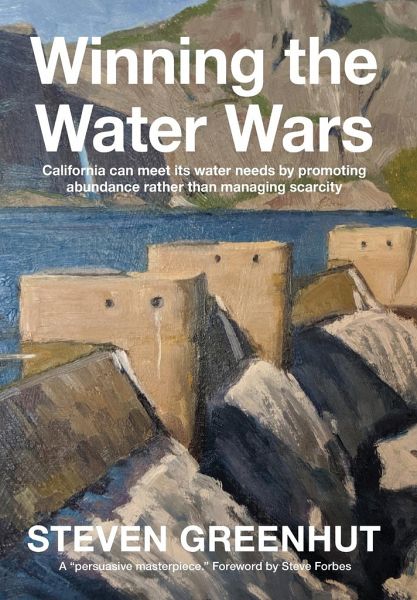
Winning the Water Wars
California can meet its water needs by promoting abundance rather than managing scarcity

PAYBACK Punkte
33 °P sammeln!
In his new Pacific Research Institute book Winning the Water Wars, journalist and R Street Institute western region director Steven Greenhut writes that California can end its decades-long battles over water and meet the needs of its current and future population by promoting abundance rather than managing scarcity. Greenhut writes, "this book does not propose solely building more dams . . . I explain the importance of water pricing and trading, regulatory reforms, desalination, wastewater treatment, upgrading water-conveyance systems and other ideas. I'm for all of the above . . . The main fo...
In his new Pacific Research Institute book Winning the Water Wars, journalist and R Street Institute western region director Steven Greenhut writes that California can end its decades-long battles over water and meet the needs of its current and future population by promoting abundance rather than managing scarcity. Greenhut writes, "this book does not propose solely building more dams . . . I explain the importance of water pricing and trading, regulatory reforms, desalination, wastewater treatment, upgrading water-conveyance systems and other ideas. I'm for all of the above . . . The main focus is on creating water abundance, rather than on having political fights over a declining water supply." He provides readers with a rich history, geography, and background information to guide readers through how the state arrived at its current predicament - accompanied by dozens of beautiful photos of California's rivers, lakes, streams, and water infrastructure installations, many taken by the author. Greenhut argues that environmental groups, who typically oppose water storage and infrastructure projects, are not succeeding in restoring fish populations by flushing more water out to sea through our rivers. Abundance would be a more effective way to restore fish and habitats. "Without water infrastructure, California would largely be a wasteland or far less populous. There's nothing wrong with prioritizing the needs of people, while still paying attention to habitat restoration. More water allows the state to deal with all these priorities," he writes. Finally, he outlines policy reform ideas to responsibly shape California's water future, including free-market ideas to improve water supply such as a more accurate water-pricing system that would facilitate transfers and trading. Greenhut writes, "The state needs to reform its regulatory barriers to water trading, so water-rights holders are better able to sell water to those who need it most. California also needs a better pricing system to allow markets to work their magic. But pricing must come against a backdrop of water abundance rather than one that leaves everyone fighting over an artificially capped supply."














